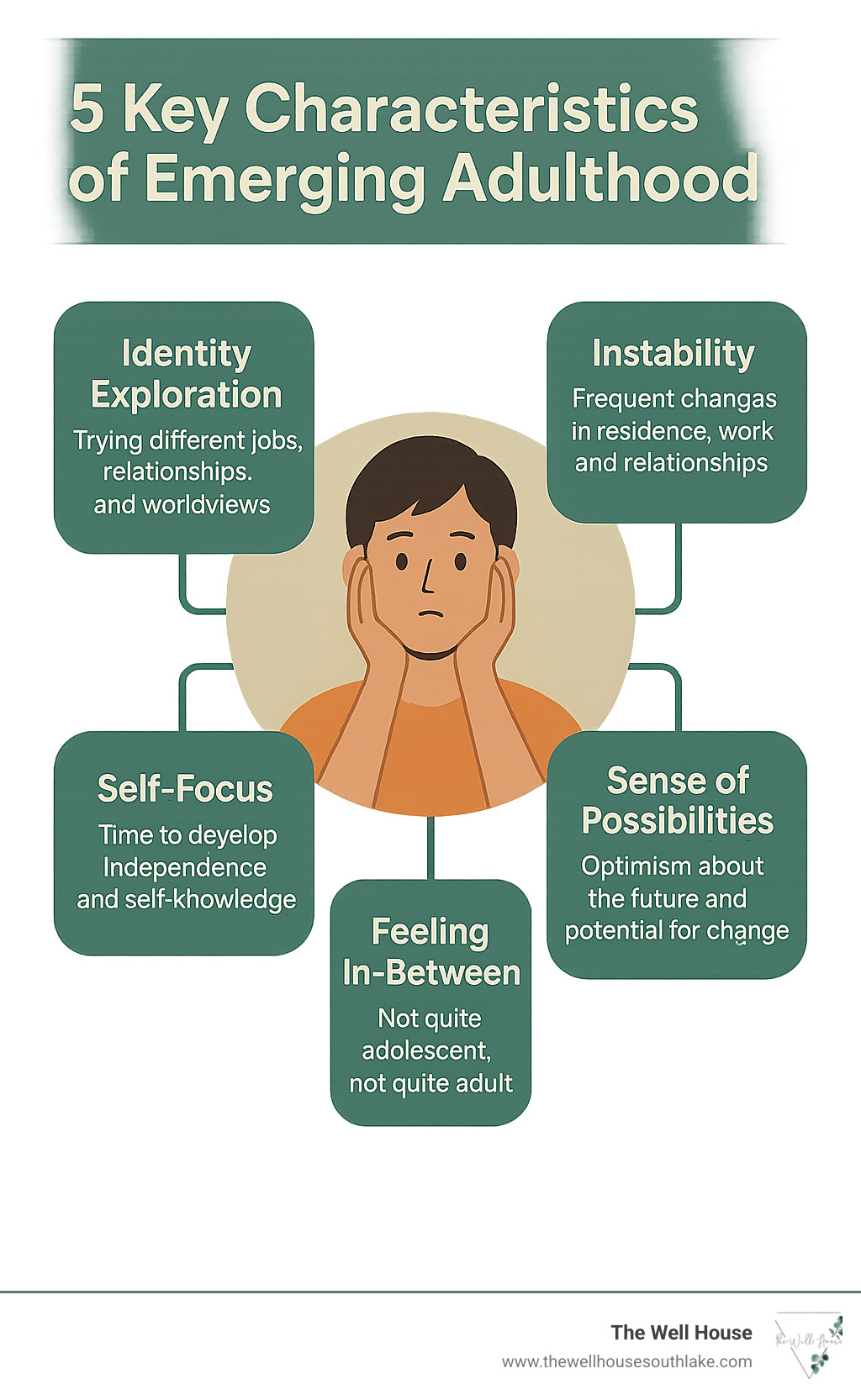Emerging Stronger: Specialized Therapy for Young Adults in Transition
Navigating the “In-Between” Years
Therapy for emerging adults addresses the unique mental health needs of individuals aged 18-29 who are navigating major life transitions and identity formation. Here are the key therapy options available:
Most Effective Therapy Types:
- Cognitive Behavioral Therapy (CBT) – Helps with anxiety, depression, and decision-making
- Dialectical Behavior Therapy (DBT) – Builds emotional regulation and interpersonal skills
- EMDR Therapy – Processes past trauma and builds self-esteem
- Acceptance and Commitment Therapy (ACT) – Develops values-based living and psychological flexibility
Common Issues Addressed:
- Career uncertainty and “failure to launch” concerns
- Relationship challenges and boundary setting
- Anxiety, depression, and identity exploration
- Past trauma and building self-confidence
- Substance use and emotional dysregulation
The path to independence for today’s emerging adults is far more complex than for previous generations. This “in-between” stage from ages 18-29 brings unique challenges. Delayed milestones, career uncertainty, and financial pressures make the transition to adulthood longer and more complicated. With three-quarters of all serious mental illnesses beginning before age 25, it’s a critical time, yet emerging adults are the least likely to seek help.
This isn’t about being “lazy” or “entitled.” Emerging adulthood is now recognized as a distinct developmental stage with its own vulnerabilities. Your brain is still developing, especially the parts responsible for decision-making and emotional regulation. The pressure to have it all figured out while navigating identity, relationships, and an uncertain future can feel overwhelming.
As a Licensed Professional Counselor Supervisor specializing in therapy for emerging adults, I’ve helped countless young adults steer these transitions. My holistic approach helps clients find their authentic path and build the resilience to thrive.

Therapy for emerging adults terms to remember:
- career counseling for millennials
- counseling for graduate students
- emotional intelligence counseling
What is Emerging Adulthood and Why Does It Feel So Different Now?
If you’re feeling stuck somewhere between being a teenager and a “real” adult, you’re not imagining things. Psychologist Jeffrey Jensen Arnett coined the term “emerging adulthood” to describe this very real developmental stage that spans roughly from ages 18 to 29.
This isn’t just extended adolescence. Emerging adulthood is a distinct life phase that didn’t exist for previous generations in the same way. They often followed a predictable path: school, job, marriage, house, kids. Today’s timeline is far less linear due to societal shifts, economic realities, and expanded opportunities.

What makes this stage unique is the constant state of transition and exploration as you figure out who you are. You might feel “in-between”—not quite a teenager, but not a full adult either.
Interestingly, emerging adults define adulthood differently than previous generations. Rather than external milestones like marriage, this generation values internal qualities like “accepting responsibility for yourself” and “making independent decisions,” which can feel subjective and unclear.
This extended period of identity exploration comes with real mental health risks. Statistics on young adult mental health show that three-quarters of serious mental illnesses begin before age 25. Many young adults assume their struggles are just “normal” stress and don’t seek help. If you’re feeling overwhelmed, know that support is available – here’s more info about what to do when you’re feeling overwhelmed.
The Unique Challenges of This Generation
Today’s emerging adults face a unique set of pressures.
The financial landscape is drastically different. Crippling student loan debt makes it harder to achieve traditional markers of independence.
Career uncertainty is the new norm. Many emerging adults change jobs frequently to adapt to a demanding job market, with over half of college graduates leaving their first job within two years.
Social media adds another layer of complexity. The constant pressure of comparison to others’ highlight reels makes it easy to feel like you’re the only one struggling behind the scenes.
Family dynamics shift as you seek independence while possibly still needing parental support, creating tension and confusion.
Relationship complexity reaches new heights as you steer your first serious romantic partnerships and learn to build meaningful friendships.
Academic pressure transitions from high school stress to the challenges of college and the daunting leap into the working world.
For those struggling with social connections, understanding social anxiety in young adults can provide valuable insight.
How Your Brain is Still Developing
Here’s something that might surprise you: your brain isn’t finished developing until your mid-twenties. Your prefrontal cortex—the brain’s “CEO”—is still under construction.
This area controls decision-making, emotional regulation, and impulse control. If you struggle with these, you’re not broken; your brain is still learning. This explains the tendency to take risks and make choices that seem inconsistent—it’s part of your brain’s natural development.
The good news is that this ongoing brain development makes emerging adulthood a critical window for growth. The coping skills you learn now can profoundly shape your future. This is why therapy for emerging adults is so effective; you’re working with your brain’s natural plasticity to build healthier patterns.
Understanding this can be incredibly freeing. Those moments of feeling scattered or uncertain aren’t personal failures—they’re part of a normal developmental process. With the right support, you can steer this time with more confidence.
How Specialized Therapy for Emerging Adults Paves the Way Forward
The unique developmental stage of emerging adulthood calls for more than general counseling. Therapy for emerging adults is often transformative, offering a custom space for growth that truly understands what you’re going through.

At The Well House, we recognize your struggles are natural responses to a challenging life transition. Our personalized support creates a safe, non-judgmental space to explore your thoughts and feelings. Our collaborative, holistic approach focuses on mind, body, and spirit wellness. We empower you to gain clarity and build resilience, acting as a skilled guide while you steer unfamiliar territory.
The beauty of specialized therapy for emerging adults is that it meets you where you are. Your therapist understands that your brain is still developing and that feeling “in-between” is normal. For practical ways to manage stress, exploring Stress Management Young Adults can provide additional tools.
Build a Foundation for Your Future Career and Relationships
Therapy helps you build essential life skills for your future. If you feel stuck creating career goals or navigating relationships, that’s understandable—these skills take practice.
Goal setting becomes more manageable when you can identify your core values and translate them into achievable steps. A therapist can help you overcome imposter syndrome—that nagging feeling that you’re fooling everyone—and develop strategies to move forward.
Improving communication and setting healthy boundaries are crucial skills you’ll develop. Learning to express your needs clearly is essential in all areas of life, from family to work, and these skills are learned through guidance and practice.
Navigating work-life balance can feel impossible when you’re starting your career. Therapy provides a space to establish healthy habits, develop self-compassion, and prevent burnout. For more specialized support, Career Coaching for Young Adults can provide additional resources.
Heal from the Past and Build Self-Esteem
Many young adults carry invisible wounds from the past. Even if you don’t consider certain experiences “traumatic,” therapy can help you process them if they impact how you see yourself or relate to others.
Addressing past trauma helps you understand how experiences shaped your beliefs about your worth. You’ll learn to understand your triggers and develop healthier coping mechanisms. Techniques like EMDR are particularly effective for processing difficult memories. You can learn more about EMDR Complex Trauma and how it might help.
Developing self-compassion is transformative for those who are their own harshest critics. Learning to treat yourself with kindness builds a foundation of self-acceptance, helping you gain confidence in your choices.
The goal isn’t to erase your past, but to integrate these experiences so you can move forward with greater strength. For additional insights, How to build their self-esteem and gain confidence offers valuable perspectives.
A Space to Address Your Mental Health Concerns
Emerging adults face significant mental health risks but are often the least likely to seek help. While some stress is normal, persistent mental health symptoms deserve care.
Anxiety and depression are highly treatable. Anxiety may appear as constant worry, while depression can manifest as persistent sadness or loss of interest.
Burnout is increasingly common among those juggling school, work, and social pressures, leading to physical and emotional exhaustion.
Substance use often develops as a way to cope with stress. The emerging adult years are a critical time to address these patterns.
Getting a proper diagnosis can be a relief. A mental health professional can distinguish between normal stress and a clinical condition, and they can teach you practical coping strategies for life.
For immediate relief, Strategies to calm down with anxiety provides practical techniques. Seeking help isn’t a sign of weakness—it’s a sign of wisdom.
Finding the Right Support: Your Guide to Starting Therapy
Taking the first step toward therapy for emerging adults is a brave investment in your future. However, knowing where to start can feel overwhelming.
If you’re wondering if your struggles are “serious enough” for therapy, know that you don’t need to be in crisis. Feeling stuck, overwhelmed, or that you’re not living up to your potential are all valid reasons to seek help. If you’ve noticed changes in your mood or relationships, or you’re struggling with big decisions, therapy is designed to address these issues.
Seeking help is a sign of strength. Just as you’d see a doctor for a physical injury, caring for your mental health is vital. For those who prefer virtual sessions, Online Therapy for Students offers a convenient option.
Common Types of Therapy for Emerging Adults
At The Well House, our diverse team of counselors in Southlake, TX, and across North Texas uses different evidence-based approaches to meet your unique needs.
Cognitive Behavioral Therapy (CBT) is a practical approach that helps you identify and challenge negative thought spirals that keep you stuck.
Dialectical Behavior Therapy (DBT) is helpful for emotional intensity, teaching skills in mindfulness, distress tolerance, emotion regulation, and interpersonal effectiveness.
EMDR Therapy (Eye Movement Desensitization and Reprocessing) helps your brain process traumatic memories so they no longer impact your daily life. Learn more about EMDR Therapy in Southlake, TX.
Individual Counseling provides a one-on-one space to focus on your growth, set goals, and develop coping strategies.
Acceptance and Commitment Therapy (ACT) helps you accept difficult thoughts and feelings while living a life guided by your core values.
Psychoeducation is simply about understanding what you’re experiencing, which empowers you to take an active role in your healing.
We also offer family therapy to help improve communication and reduce tension as your family system adjusts to your growing independence.
Practical Steps to Begin Your Journey
Starting therapy doesn’t have to be complicated.
- Research therapists who specialize in emerging adulthood. At The Well House, we offer a collaborative, holistic approach that honors your whole self.
- Check your insurance for mental health benefits. We are an out-of-network provider but can give you a superbill for potential reimbursement.
- Schedule a consultation call. We offer free consultations so you can ask questions and see if we’re a good fit, ensuring you feel confident in your choice.
- Prepare for your first session. This is typically an intake conversation where we’ll get to know you and create a customized plan. There’s no pressure to share more than you’re comfortable with.
- Find the right therapeutic relationship. Feeling heard and understood is crucial. If the first therapist isn’t the right match, our team will help you find the best fit for you.
For answers to common questions, our FAQ page is a helpful resource.
Frequently Asked Questions about Therapy for Emerging Adults
Starting therapy for emerging adults is a big step, and it’s normal to have questions. Here are answers to common concerns.
How do I know if my problems are “bad enough” for therapy?
The truth is, no problem is too small for therapy. You don’t need to be in crisis to deserve support. If you’re feeling stuck, overwhelmed, or uncertain, that’s reason enough. Therapy is for growth, not just crisis management. If your feelings are interfering with your daily life or well-being, reaching out is a proactive step toward investing in yourself.
What’s the difference between talking to a therapist and talking to a friend?
Friends are vital, but therapy offers something different. A therapist is an unbiased, trained professional who can offer objective perspective. They use evidence-based strategies to help you uncover patterns you might not see on your own. Everything you say is held in strict confidentiality, creating a safe space for honesty. Finally, the time is focused entirely on you and your growth.
How long does therapy take for an emerging adult?
The length of therapy depends entirely on you and your goals. Some people come for short-term therapy (often 12-20 sessions over 4-5 months) to address specific challenges, while others choose longer-term therapy for deeper exploration. At The Well House, we use measurement-informed care, meaning we regularly check in on your progress and adjust our approach. You and your therapist will work together to determine the right timeline for your journey.
Insurance & Payment Options at The Well House Southlake
At The Well House Southlake, we believe that quality mental health care should be both accessible and affordable. Whether you’re seeking therapy, couples counseling, or online sessions, our goal is to make it easy for you to access therapy that takes insurance and supports your unique needs.
We currently accept:
- Blue Cross Blue Shield (BCBS)
- Aetna
- United Health care (UHC)
- Self-Pay and Out-of-Network Options
If you’re exploring counseling that takes insurance or need help verifying your coverage, our team will guide you through each step — from confirming your benefits to booking your first session. We’re committed to making your experience simple and stress-free, so you can focus on what matters most: your well-being.
Emerge Stronger and More Confident
The journey through emerging adulthood is filled with unique pressures, from career uncertainty to complex relationships. These challenges aren’t character flaws; they are the normal growing pains for a generation creating new paths to adulthood.
Therapy for emerging adults is your greatest opportunity for growth during this critical window. It’s an investment in your future self. Working with a specialized therapist means you’re not just surviving this transition—you’re building the foundation for everything that comes next. The skills you develop now—emotional regulation, healthy boundaries, and self-confidence—will become the bedrock of your future success and satisfaction.
At The Well House, we’ve seen countless young adults transform from feeling stuck to becoming clear and confident. Our collaborative, holistic approach recognizes that you don’t need fixing—you need support, understanding, and practical tools.
Taking control of your life path starts with asking for help—the most adult thing you can do. When the pressure is real, you deserve specialized, professional guidance to steer major life transitions. Your twenties are happening now. You can invest in yourself and emerge stronger, more confident, and genuinely excited about your future.
Get the real help you need with counseling for young adults











